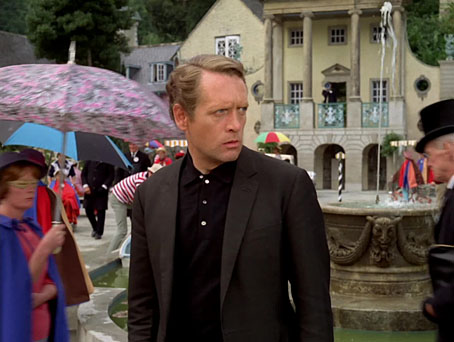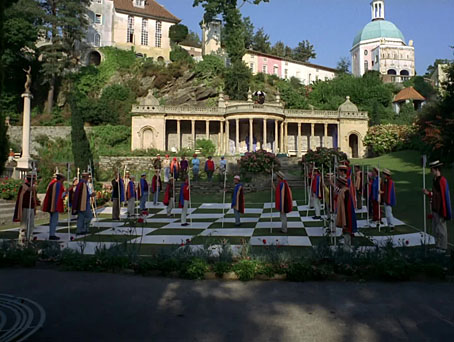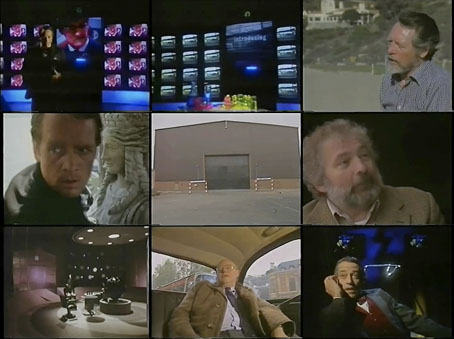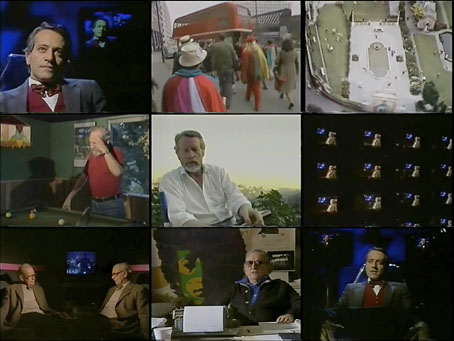
Patrick McGoohan.
Network DVD had a sale recently so I finally capitulated and bought the blu-ray set of The Prisoner which I finished watching this weekend. The picture quality is so outstanding it might have been made yesterday, and many of the extras are also essential for Prisoner obsessives, not least a restored print of the original cut of the first episode, something that was believed lost for years.

Episode 9: Checkmate.
There’s no need to enthuse about the series when I’ve done so already; this time round I’ll note that while the Cold War background is thoroughly outmoded some of the themes of particular episodes seem more relevant than ever. The model of total surveillance seen in the Village has for some time seemed to be one that Western governments and tech corporations would love to emulate. (“The whole world as the Village?” asks The Prisoner. “That’s my hope,” says Number 2.) The Prisoner isn’t the only drama to deal with authoritarian control, of course, but it also deals with the soft tyranny of closed communities, ideology and group-think. Episode 12, A Change of Mind, concerns a process whereby disobedient Villagers are confronted by their peers, declared “unmutual” then bundled off for corrective therapy; when they return they repent their antisocial crimes in public. In 1967 such a scenario would have seemed reminiscent either of McCarthyite America, or Soviet Russia and Maoist China; in 2015 you can be declared “unmutual” for minor infractions every day on the internet, and find yourself rounded upon by a sanctimonious horde.

The allegorical and symbolic qualities of The Prisoner have kept the series fresh for almost 50 years while the character who launched the genre that gave rise to series—James Bond—has required several overhauls in order to keep up with changing times. Bond may bicker with his superiors but he’s always been a tool of the status quo, an agent of the Control virus in Burroughsian terms. In episode 8, The Dance of the Dead, The Prisoner is lectured by a judge in a kangaroo court on the importance of “the rules”. “Without rules, we have anarchy,” she says. The Prisoner, who happens to be dressed in a Bondian dinner jacket, replies “Hear, hear.”
Situated where the fantastic borders on modern science fiction and the spy story, McGoohan’s postulate, like that of Kafka, Gustav Meyrink and Alfred Kubin, sets up a fictional structure that, like a Möbius strip, offers no purchase to the rationality of an innocent reading.
François Rivière in The Prisoner: A Televisionary Masterpiece (1990)
Among the extras on the blu-ray set there’s an inevitable “featurette” about the making of the series. I would have preferred to see the inclusion of Six Into One: The Prisoner File, a 50-minute TV documentary about the making (and meaning) of the series written by Chris Rodley and directed by Laurens C. Postma. This was screened in the UK on Channel 4 in 1984, shortly after a repeat showing of the series. Six Into One remains the best of all the Prisoner documentaries for being made at a time when many of the people involved in the production were still alive, and also for the interview with the instigator of the series, its star, and also occasional writer and director, Patrick McGoohan.
Laurens Postma made several independent documentaries for Channel 4 in the 1980s including Long Live the New Flesh: The Films of David Cronenberg (1987), and Derek Jarman: Do You Known What I Mean? (1988). Six Into One presents its material via a Number 2-like interrogator who sits in a darkened studio before a bank of TV monitors going through the files of those involved with the series. Among the contributors there are directors Don Chaffey and Pat Jackson, writer/director David Tomblin, writer Lewis Greiffer, script editor George Markstein, ITC boss Lew Grade, and actor Alexis Kanner. Markstein was an ex-MI5 man who regarded The Prisoner as a continuation of the Danger Man spy series that preceded it, even though The Prisoner is overtly symbolic and fantastic in a way that Danger Man never was. In Postma’s interview Markstein continues to insist that The Prisoner character was Danger Man John Drake despite The Prisoner never being named, and despite McGoohan’s assertion that the whole thing is an allegory. It’s no surprise to read that the two men fell out over this. McGoohan in his own interview reiterates one of the points I make above, that it’s the allegorical nature of the series, its lack of easy resolution and openness to interpretation, that keeps it fresh. Nearly fifty years on, the series that Roland Topor called “the greatest science fiction film of all time” retains its allure.
Previously on { feuilleton }
• Long Live the New Flesh: The Films of David Cronenberg
• In the Village
• Patrick McGoohan and The Prisoner



The “featurette” on the blu-ray is a full 90 minute documentary called Don’t Knock Yourself Out and seems excellent to me. It includes some clips and outtakes from Six Into One and also some fascinating comments from Leo McKern in what I think may be the only recorded interview with him about The Prisoner.
The NFT showed a compilation of Prisoner rarities a while ago which included longer versions of the McGoohan interview from Six Into One. There were plans to release these on DVD but sadly that hasn’t happened.
McGoohan apparently disliked Six Into One and made his own “documentary” which is known as The LA Tape.
The Blu Ray set really is a revelation when you first see it! I did the rewatch earlier this year after being lucky enough to spend some time in the company of the frankly astonishing Derren Nesbitt. In his opinion McGoohan didn’t have any clear idea of what he was trying to say, even as late as the filming of ‘It’s Your Funeral’ (seventh episode recorded). Whatever the truth of the matter, you’re quite right to note that The Prisoner remains not only untarnished by the passage of the years (or Jim Caviezel!) but is actually more relevant than when it was made. No mean feat by anyone’s standards. Still my favourite TV series by a very wide margin.
The run of actors playing Number Two was one of the many things that made the series so good, not only Derren but Peter Wyngarde, Mary Morris, Eric Portman, Patrick Cargill…
Not having a clear idea of what you’re doing can often be a bonus, you end up with something that surprises yourself as well as an audience. I found this with the Reverbstorm series: we were improvising from start to finish but connections would keep arising that hadn’t been planned at all.
Big, big “thank you” for introducing “The Prisoner” to me. The series is unknown in Poland (well, at least it was unknown to me) and nowa I’m catching up on it. I was surprised to find some parts of dialogues familiar and it took me a second to realize they were sampled in Iron Maiden’s “The Prisoner”. Which of course might be only the first and most obvious of many more connections that are to come.
Your blog is the inexhaustible source of goodness.
Hi azudem, and thanks, I’m pleased to hear this has stimulated your interest. The series has been a cult thing in the UK for many years so dialogue has been sampled many times. One of my favourite is this one from Colourbox which also includes samples from Westworld, 2001: A Space Odyssey and others:
https://www.youtube.com/watch?v=HOjNAOm2MGQ